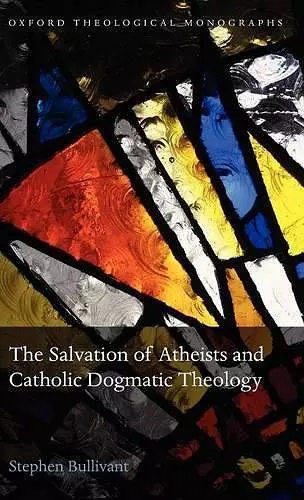The Salvation of Atheists and Catholic Dogmatic Theology
Format:Hardback
Publisher:Oxford University Press
Published:19th Apr '12
Currently unavailable, and unfortunately no date known when it will be back

Since the Second Vatican Council (1962-5), the Catholic Church has formally declared the possibility of salvation for atheists: 'those who, without fault, have not yet arrived at an express recognition of God' (Lumen Gentium 16). However, in the very same document, the Council also reiterates the traditional doctrine of the necessity of faith, baptism, and the mediation of Church in order for someone to be saved (Lumen Gentium 14). This monograph explores how these two seemingly contradictory claims may satisfactorily be reconciled. Specifically, it asks - and ultimately answers - the question: How, within the parameters of Catholic dogmatic theology, is it possible for an atheist to be saved? As the first full-length study of this topic since Vatican II, the book discusses crucial foundational issues - the understanding of 'atheist' in Catholic theology; the developing views on both unbelief, and the salvation of non-Christians, in the decades preceding the Council - before tackling the conciliar teaching itself. Considerable attention is then given to the classic solution of imputing an 'implicit' faith to righteous atheists, best known from Karl Rahner's theory of 'anonymous Christians' (though the basic idea was advocated by many other major figures, including Ratzinger, Schillebeeckx, de Lubac, Balthasar, and Küng). After discussing Rahner's specific proposals in detail, this kind of approach is however shown to be untenable. In its place, a new way of understanding Vatican II's optimism for atheists is developed in detail, in light of scripture, tradition, and magisterium. This draws principally on Christ's descent into Hell, a renewed understanding of invincible ignorance, and a literal interpretation of Matthew 25.
This solution [to the problem of the salvation of atheists] is both fully traditional and surprisingly innovative. * Stephen Waldron, Journal of Theological Studies *
This is undoubtedly a work of creative excellence which brilliantly and lucidly sustains a technical argument concerning dogma through an inventive appeal to Scripture and tradition. * Marcus Pound, Theology *
Bullivant's book is essential reading for dogmatic theologians in the Catholic tradition and will also be of interest to historical theologians whose focus is directed to the build-up to Vatican II. * Matthew Edward Harris, Theological Book Review *
Bullivant has raised important questions and discussed them with commendable clarity. * Paul Richardson, Church of England Newspaper *
ISBN: 9780199652563
Dimensions: 223mm x 148mm x 20mm
Weight: 428g
240 pages